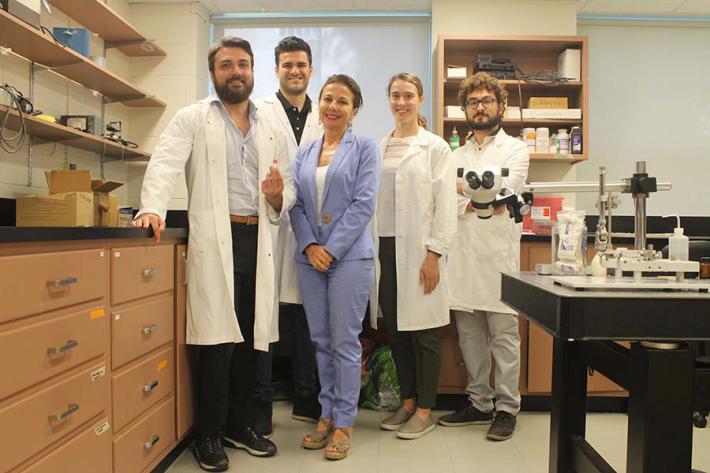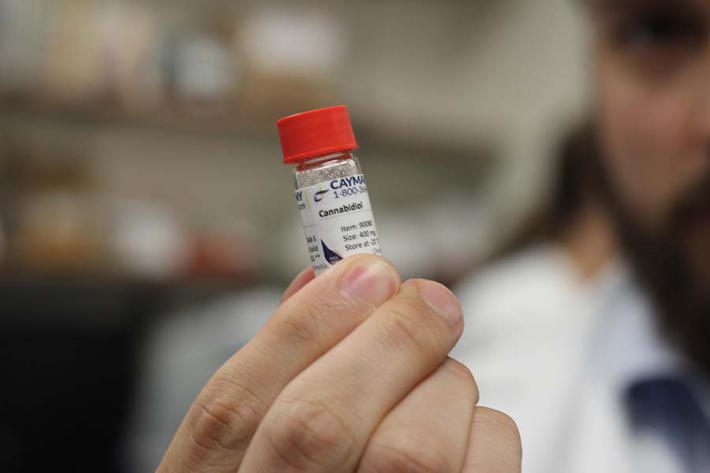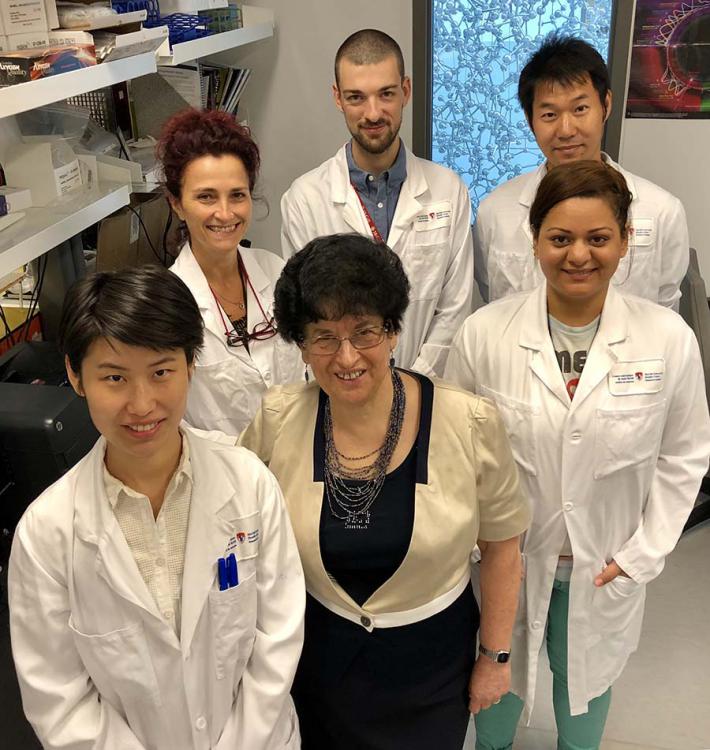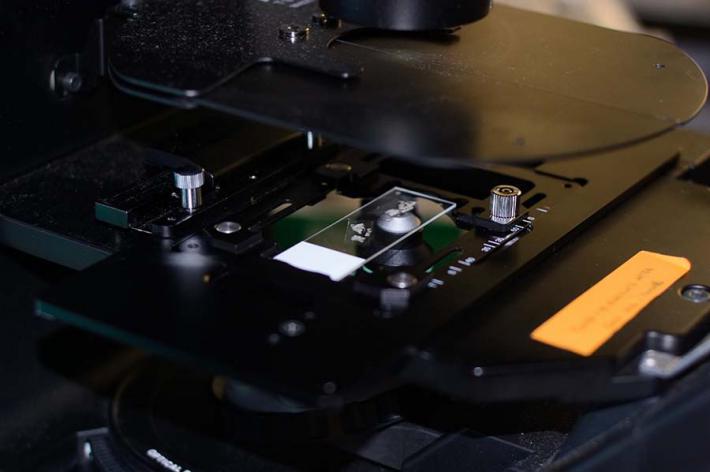Two RI-MUHC researchers receive prestigious provincial grants for innovative projects
Two researchers from the Research Institute of the McGill University Health Centre (RI-MUHC) have each received Ministry of Economy, Science and Innovation (MESI) grants totaling $500,000 to support the completion of their international collaborative projects.
The first research project is led by Dr. Gabriella Gobbi, who is a researcher in the Mental Illness and Addiction Axis at the RI-MUHC and associate professor in the Faculty of Medicine at McGill University. Dr. Gobbi, whose laboratory has been studying cannabis for the last 20 years, is interested in the pharmacological effects of cannabidiol (CBD) oil – the less addictive component of cannabis – as a therapy for chronic pain and related mood disorders such as anxiety and depression.

Dr. Gabrielle Gobbi (centre) and her team at the RI-MUHC will study the effects of cannabis as a therapy for chronic pain and anxiety.
“There are very few evidence-based studies on the efficacy of cannabis in specific diseases,” she says. “We want to study the mechanism of action of pure CBD in the treatment of neuropathic pain associated with depression and anxiety and launch a clinical trial.”

Dr. Gobbi hopes to prove the efficacy of cannabidiol oil – the non-addictive component of cannabis – in the treatment of mood disorders.
Over the next three years, Dr. Gobbi and her team will work with a group of international research scientists from Italy, and with Aurora Cannabis Inc., a licensed producer of medical cannabis.
The second project is led by Dr. Pnina Brodt, PhD, a researcher who has been studying cancer metastasis for close to 20 years at the RI-MUHC and MUHC and who is a professor in the Department of Surgery, Medicine and Oncology at McGill University. Dr. Brodt’s project is also being supported by the MUHC Foundation.

Ms. Pnina Brodt and her team are hoping to develop a therapeutic strategy to improve the treatment of glioblastoma multiforme—an aggressive form of brain cancer—by optimizing the delivery of a drug she and her lab are developing through the blood-brain barrier.
“We are proud to have committed $250,000 to support Dr. Brodt's research. This investment was instrumental in her ability to secure the prestigious Ministry of Economy, Science and Innovation grant that will allow her to further her groundbreaking research,” says Julie Quenneville, president of the MUHC Foundation. “This is a true demonstration of how philanthropy has the power to drive research and transform care for cancer patients in our community.”
The overarching goal of Dr. Brodt’s project, which she is pursuing collaboratively with biotech firms in Israel (Brainsway), Quebec (Oleotek) and Ontario (Ovensa), is to develop a therapeutic strategy to improve the treatment of glioblastoma multiforme—an aggressive form of brain cancer by optimizing the delivery of a new drug through the blood brain barrier (BBB).
“Over the years we identified the receptor for the type 1 insulin like growth factor (IGF-1 receptor) as a survival factor for cancer cells, which promotes their growth and increases their resistance to drugs.

Counting and analyzing cancer cells in Prof. Pnina Brodt’s lab.
This led to the development of the IGF-TRAP that acts as a decoy and in this way reduces the activity of this receptor. We obtained evidence that glioma cells are sensitive to the blockade of the IGF-1 receptor. The problem is that because of its size, the IGF-TRAP cannot easily cross the blood brain barrier and get to glioma cells in the brain. This is a general problem with targeting brain cancers with biological drugs. In this project we will be combining two novel technologies to overcome this barrier to successful treatment of glioblastoma,” says Dr. Brodt.
This is where Brainsway and Ovensa/Oleotek come in. Brainsway developed the Transcranial Magnetic Stimulation (TMS) – an FDA approved technique that can temporarily open the blood brain barrier, while Ovensa and Oleotek are developing nanoparticles (TRIOZAN nanocarriers) that can be used to enable drug delivery through the BBB by adsorption through receptors on endothelial cells. “We will first assess these technologies each separately with the IGF-TRAP and then test them together to see if there is a synergy,” says Dr. Brodt.
If successful, this approach could be used to facilitate the delivery of other drugs to the brain.
Science at its best
Both Dr. Gobbi and Dr. Brodt believe that these types of partnerships contribute to the advancement not only of their work, in particular, but to science, in general.
Dr. Gobbi’s and Dr. Brodt’s projects were selected in April 2017 as part of MESI’s Research Support Program for international research and innovation initiatives.
